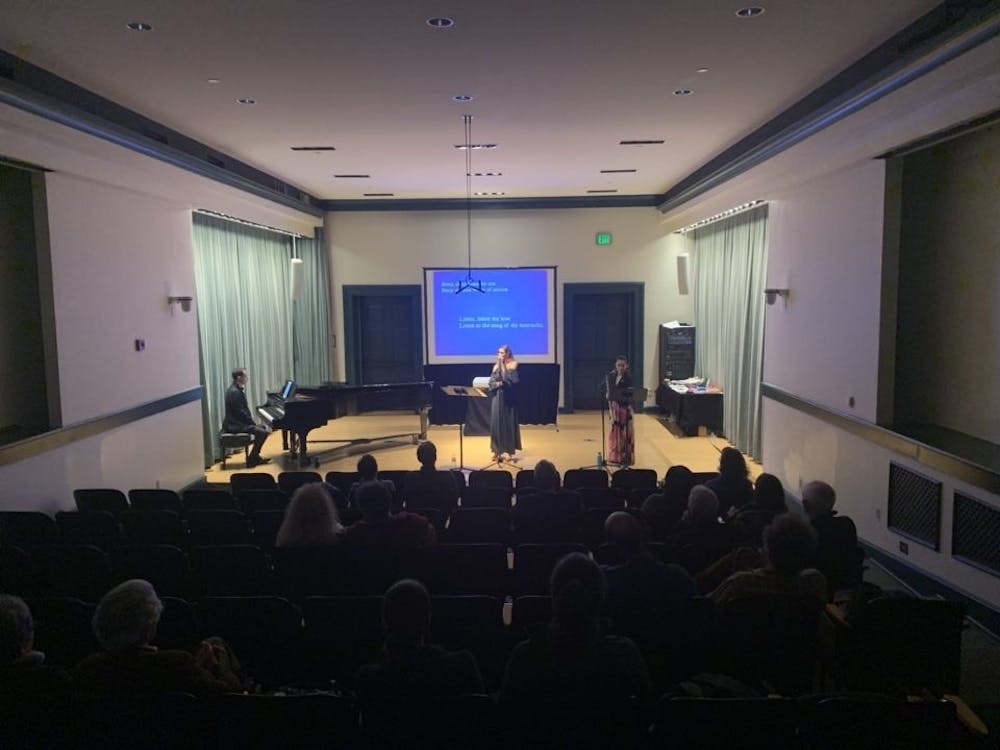Present day commemorations, whether in the form of service, art or expression, are irreplaceable markers of historical narratives that must not be forgotten.
The Greek Chamber Music Project (GCMP), is an arts presenter and record label devoted to performing the eccentric music of Greek composers. On Tuesday, Nov. 5, GCMP presented an emotionally-charged and impactful program at the Peabody Institute in memory of the Holocaust, called Remembering the Jews of Greece: A Musical Journey.
As a group, GCMP hopes to draw more light and appreciation to lesser known chamber music works. Their goal for the event was to honor the Sephardic Jews, who carry a long history in Greece with deep social, religious and musical traditions.
The performance primarily featured Sarah Aroeste, who sang many soulful songs in Ladino, the Judeo-Spanish language of the Sephardim. By implementing unique interpretations of these Sephardic songs as well as her original compositions, which she also sang in Ladino, Aroeste is taking great strides to keep the language alive.
Alongside Aroeste was her longtime pianist and producer, Shai Bachar, as well as special guest flautist Ellie Falaris Ganelin. Together, the trio exposed the audience to a fresh multimedia performance using videos, live music and sound clips.
One of the first few songs that Aroeste sang, “Las Estreyas,” was about finding one’s fate in the stars.
She prefaced this piece by describing the Ladino language.
“You’ll hear words of French, Portuguese, Hebrew, Italian, Turkish and Arabic. It’s a really beautiful Mediterranean language that people sadly don’t hear a lot of today. This is a Sephardic experience, rich in song and spirit. Today, we celebrate this rich tapestry while also paying tribute to those who perished during World War II and the Holocaust,” she said.
Shortly after this beautiful piece, Aroeste delved into a deeper conversation, shedding light on the too often overlooked history of the Holocaust in Greece, which, as a country, had the highest percentage of Jewish people murdered in all of Europe.
“The city of Salonica was obliterated, losing 94 percent of its Jewish population,” she explained.
Shen then followed with a song she had composed herself titled, “Chika Morena,” which details the story of an “iconic, dark-haired girl.”
“This song is about the girl who has been kicked out of Spain and has been wandering ever since… just to find her way home. She just wants to hold onto her roots by listening to the voices of her ancestors on this journey back to where she knows she belongs,” she stated.
A video was played in conjunction with the performance, displaying Aroeste’s own grandparents on their honeymoon in the Balkans in the mid-1930s. The videos and images gave the audience something to observe while listening to these powerful pieces.
Afterwards, Ganelin proceeded to introduce a private video of Elias, a Holocaust survivor, and his testimony from Yale University’s New Fortunoff Archive.
“I was born in Salonica, Greece on March 30, 1932. What happened there was more or less history,” Elias said. “With the persecution of Jews going on around us, there was no room for much else in my life… My father, unfortunately, was deported and didn’t return. So, my mother, brother and I escaped to Athens with the help of the underground,” he recalled.
After this, Ganelin performed a flute piece by the Sephardic composer Daniel Akiva. The piece is written in the form of a love song, supposedly because Akiva wanted to pay tribute to the Jewish people in Salonica.
Overall, the GCMP simply did a beautiful job of reaching out to the audience emotionally, as well as consistently focusing our attention on the presentation. After the event, I felt more informed and aware of the persecution of the Jews in Greece as well as the extended history behind the Holocaust. Erin Lee, a sophomore pianist at Peabody, agreed.
“I didn’t even know there were Jews in Greece, not to mention that many,” she said.
I am so glad I attended this Remembering the Jews of Greece event, and I highly recommend it in the event that they return to Baltimore.
Correction: The article mentioned the song, “Las Estrellas.” The correct spelling of the song is “Las Estreyas.”
The article also incorrectly stated that speakers discussed the city of Salaam. They actually discussed Salonica.
The News-Letter regrets these errors.





